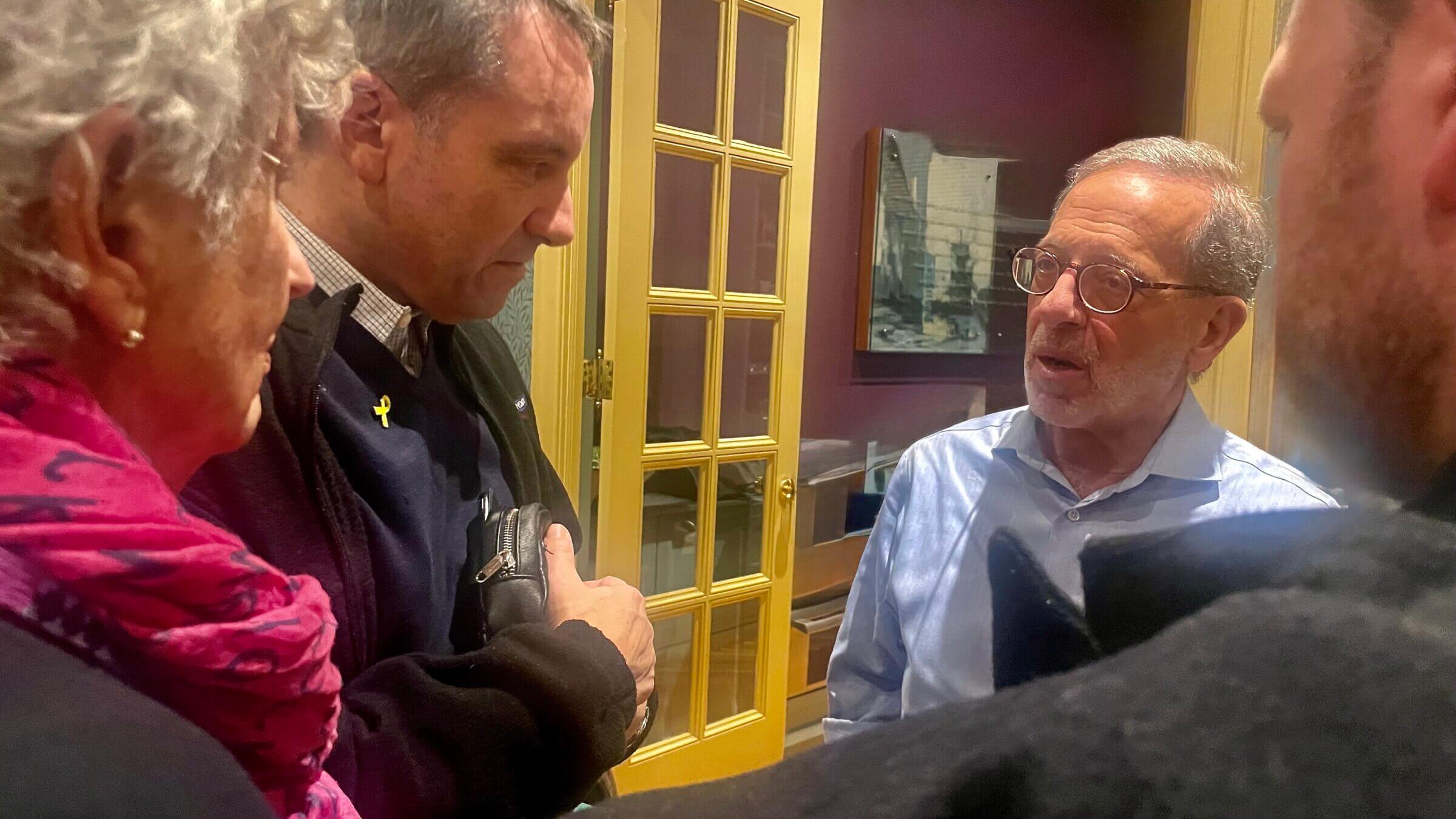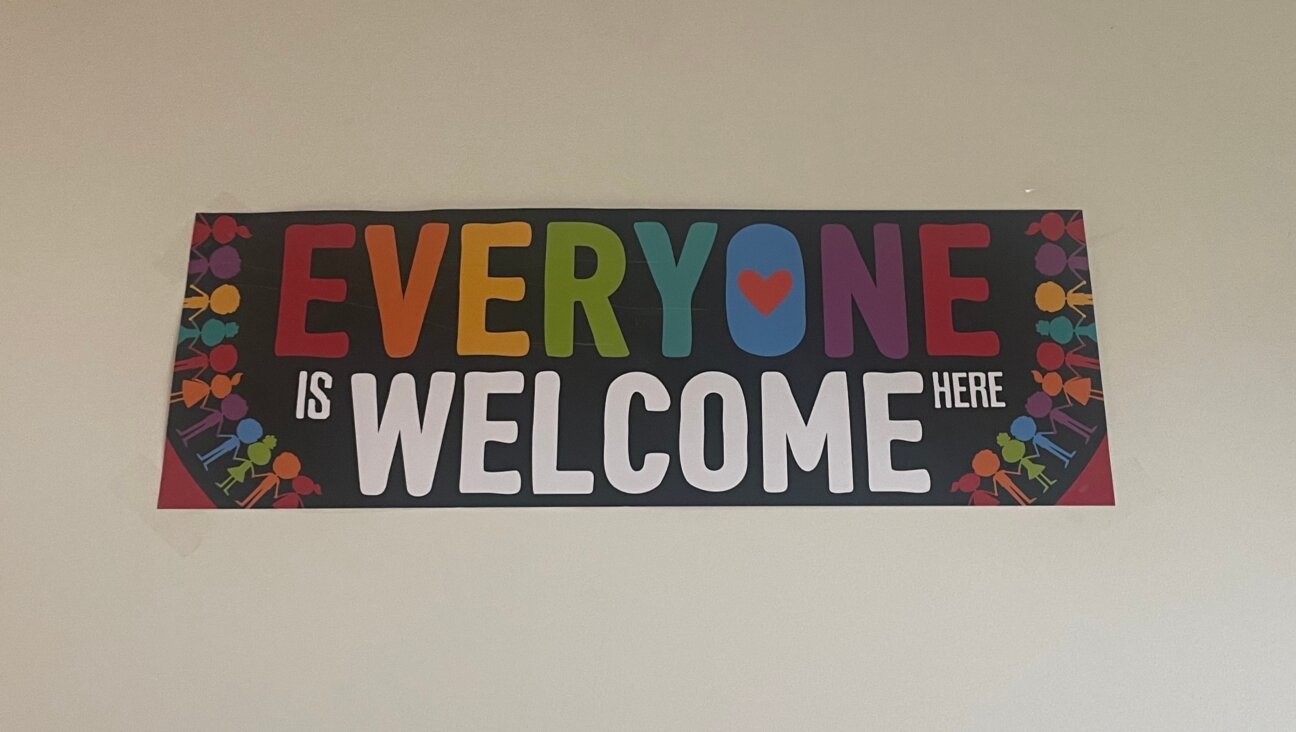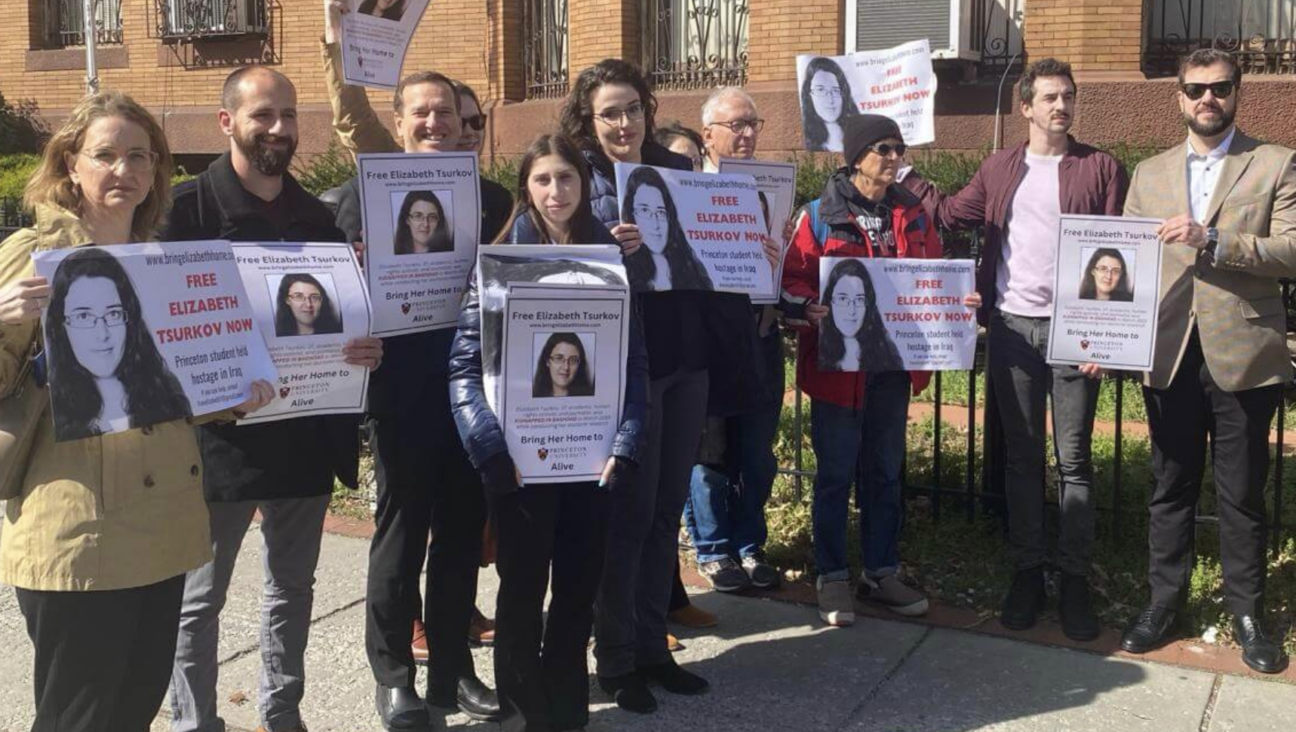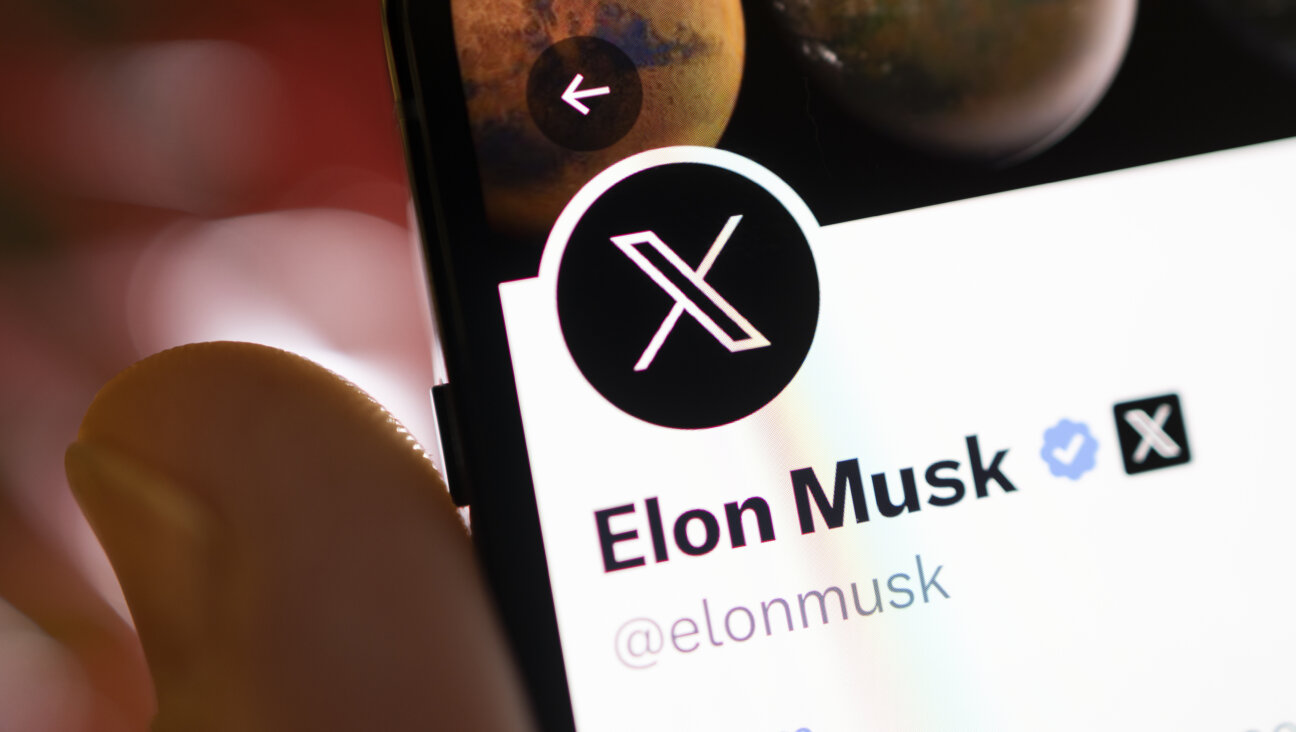One Palestinian historian. A roomful of observant Jews. And a conversation all of us must have
What I learned from watching Rashid Khalidi speak at an Upper West Side salon

Prominent Palestinian historian Rashid Khalidi speaks to a salon of mostly Orthodox Jews in the Upper West Side Photo by Jodi Rudoren
This is an adaptation of our editor-in-chief’s weekly newsletter. Sign up to get it delivered to your inbox on Friday afternoons.
The guest speaker opened by ticking off a few biographical facts sure to resonate with the crowd of mostly Orthodox Jews from the Upper West Side. He was born in 1948, the year of Israel’s founding. He has four grandchildren. His family has a strong tradition of religious learning. He’s a lifelong fan of the Brooklyn Dodgers.
Soon, he’ll be quoting from the diaries of David Ben Gurion.
“My family has a history in Jerusalem going back at least until the Crusades, maybe further,” Rashid Khalidi, the world’s preeminent Palestinian historian, said as some of the kippah-wearers and hostage-pin bearers twitched a little in their seats.
His great-great-great uncle was elected mayor of Jerusalem in 1935. His father worked for the United Nations and was in Security Council meetings regarding the Middle East so, Khalidi said, “I knew what was actually happening; I didn’t hear the lies in The New York Times.”
The laughter at this line betrayed both the beauty and the complexity of this unusual salon I attended just before Thanksgiving in a friend’s 88th Street brownstone. The Jews in the audience — Shabbat-observant, day-school parents, a few Israeli expats and rabbinic scholars — are used to hearing the Gray Lady condemned as hopelessly anti-Israel; Khalidi sees it as entrenched in a pro-Israel worldview.
“We’ve grown up on a certain Zionist history that we’re proud of — and that excludes other stories,” the organizer, an Israeli-American named Esther Sperber, had said by way of introduction. “What we’re going to hear is going to be challenging,” she added. “I hope it’s not a debate but a conversation.”
Khalidi, who recently retired from Columbia University after more than two decades, got an extra 15 minutes of fame this week after President Joe Biden was photographed buying a copy of his 2020 book, The Hundred Years’ War on Palestine. In fact, he’s been having something of an extended moment since the Oct. 7 Hamas terror attack on Israel — which he condemned — and throughout the ensuing, endless war in Gaza.
The subject of an October profile in The Guardian and a lengthy Haaretz interview just published in English, Khalidi has given scores, if not hundreds, of talks over the last 14 months of devastating violence. Yet Sperber’s salon was his first for a Jewish audience not just since Oct. 7 but in 15 or 20 years.
“I used to be invited to synagogues, I used to speak at the Hillel at University of Chicago when it was run by Rabbi Danny Leifer,” Khalidi recalled, a little wistfully. (He spent eight years at U. Chicago before moving to Columbia in 2003.)
“This is before Hillel became centralized and turned into a place where people who didn’t accept certain views weren’t welcome,” he added. “I can’t cross the threshold of a Hillel now.”
I know that quote is going to make some readers shut down. You support Hillel, your kids go to Hillel and you don’t think it’s closed-minded — or maybe you think it’s not a space where Palestinian perspectives belong. I thought about cutting the “certain views” line, to keep you reading this newsletter, to prevent you from dismissing Khalidi.
But this story, like Sperber’s makeshift group, is about breaking out of the bubbles too many of us live inside, particularly regarding Israel. It’s about the urgent need for all of us to wrestle with other people’s perspectives and narratives even about the things closest to our hearts, even when it’s upsetting. So go ahead and think Khalidi is wrong about Hillel — and The New York Times and maybe the whole conflict — but also, please, swallow hard and stick with me to hear him out.
“Israel is on a course that is, in my view, suicidal,” Khalidi told the 60-some folks crowded into the living room that night. “There are two peoples there. The Palestinians are not going to be eliminated.”
And: “Anybody who wants to talk about a two-state solution has to talk about dismantling the obstacles to it erected over the last 57 years.” He mentioned that 10% of Israeli voters live in settlements in the occupied West Bank. And the United States, despite condemning such settlements as obstacles to peace, nonetheless allows tax-deductible donations to groups that support them.
“Every single act of colonization has produced resistance.”
(I know: You may find the word “colonization” regarding Israel to be ahistorical and offensive, because Jews are also indigenous in the Holy Land, and because the pioneers who built the modern state were largely refugees from either the Holocaust or from Arab countries that expelled Jews after its founding. Let it go. Hear the rest.)
“You cannot have a system where one person’s property is sacred and another’s can be taken, based on nationality,” Khalidi said of Israel’s rules regarding land ownership.
“They are creating another generation that will fight them,” he continued, referring to the death, destruction and displacement in Gaza.
“It took years to stop the Vietnam War — years and years and years,” he cautioned. “This will be much harder.”
“Our institutions and our community has been a little too deferential, or too timid, about standing up for our values.”Esther Sperber
I first met Sperber, who is now 53, at the September 2023 rally she put together outside the United Nations to protest Prime Minister Benjamin Netanyahu’s attempts to overhaul Israel’s judiciary. When Hamas attacked two weeks later, Sperber — like the pro-democracy movement in Israel — immediately transformed her activism into support for Oct. 7 victims, survivors and hostage families.
She is an architect by trade, and an inveterate organizer who describes herself as “liberal-leaning Modern Orthodox.” The eldest of 10 siblings, she grew up in Jerusalem and has lived in New York since grad school. Her nephew was recently fighting in Lebanon. Her daughter started Harvard this fall after a gap year in Israel.
The group that hosted Khalidi has no name, no board of directors, no mission statement. It grew out of a frustration among a handful of friends who, as she put it, “felt there was a certain conversation not happening in our communities.” They’ve hosted eight events so far in various Upper West Side living rooms, including a legal seminar on settlements and a Shabbat Teshuvah d’var Torah on what the moral responsibilities are for a Jewish state. The far-left Haaretz reporter Amira Hass, who used to live in Gaza — “that was a hard talk to listen to,” Sperber recalled — and the head of Israel’s version of the ACLU.
“Since the beginning of the war, it’s been very hard to square the discourse among the Jewish community — if you say anything about the occupation of Palestinians, you’re on one side, and if you care about Israelis and the Jewish state and the hostages and my nephew who’s in the IDF, then you’re on the other side,” Sperber told me to explain the motivation behind the speaker series.
“We love Israel, and I think the occupation is terrible and this war is terrible and there’s a certain set of values that we’ve stopped discussing in our schools and synagogues, both here and in Israel,” she continued. “There’s another version of what it means to be a God-believing Jew that is not really represented. Our institutions and our community has been a little too deferential, or too timid, about standing up for our values.”
Khalidi was the first Palestinian — the first non-Jew — on the docket. Sperber told me that before she hit “send” on the email invitation, she had a hold-your-breath moment, wondering “are people going to say, ‘You’ve gone too far’?”
Two people who’d come to prior talks said they’d skip this one because they didn’t want to support Khalidi. But the event drew the largest audience yet, and while there was some tension in the air when he uttered the words “apartheid” and “genocide” — and, especially, when he was fairly dismissive of concerns that pro-Palestinian protests on campus were making Jewish students unsafe — Sperber said she heard few complaints.
“We thought it was really important to hear directly from him,” she told me. “It’s one thing to have someone come with an ideology and say ‘settler-colonialism’ and ‘apartheid’ — and something else when someone has read all the primary sources on early Zionism and can back up his claims.”
Especially, perhaps, if that someone also lives on the Upper West Side and has a son who gave him a Brooklyn Dodgers hat for his birthday.
After the talk concluded, I watched a man in the audience whip out his own Dodgers cap to show Khalidi. Which is not going to stop the fighting in Gaza or end a hundred-years war. But it did create a little more conversation.
A message from our Publisher & CEO Rachel Fishman Feddersen

I hope you appreciated this article. Before you go, I’d like to ask you to please support the Forward’s award-winning, nonprofit journalism so that we can be prepared for whatever news 2025 brings.
At a time when other newsrooms are closing or cutting back, the Forward has removed its paywall and invested additional resources to report on the ground from Israel and around the U.S. on the impact of the war, rising antisemitism and polarized discourse.
Readers like you make it all possible. Support our work by becoming a Forward Member and connect with our journalism and your community.
— Rachel Fishman Feddersen, Publisher and CEO






























